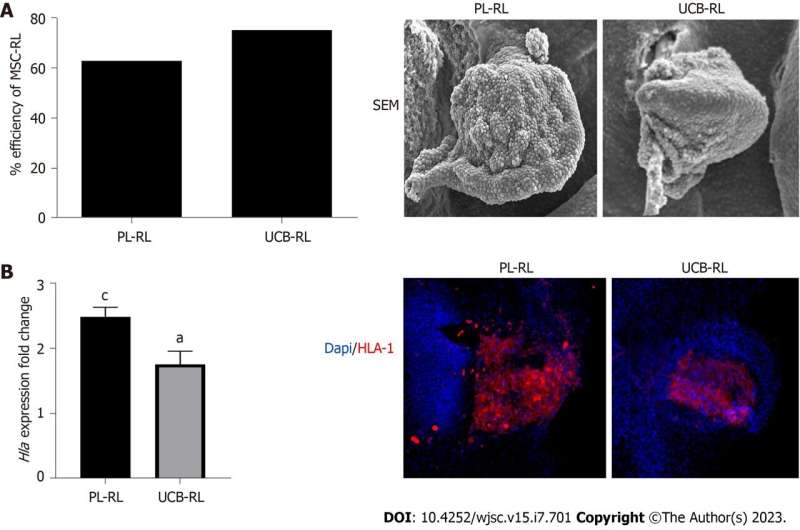Commitment of human mesenchymal stromal cells to skeletal lineages is independent of their morphogenetic capacity: Study

Mesenchymal stromal cells (MSCs) are multipotent cell populations obtained from fetal and adult tissues. They share some characteristics with limb bud mesodermal cells such as differentiation potential into osteogenic, chondrogenic, and tenogenic lineages; and an embryonic mesodermal origin.
Although MSCs differentiate into skeletal-related lineages in vitro, they have not been shown to self-organize into complex skeletal structures or connective tissues, as in the limb. In a new study work, researchers demonstrate that the expression of molecular markers to commit MSCs to skeletal lineages is not sufficient to generate skeletal elements in vivo.
Their paper is published in the World Journal of Stem Cells.
The team set out to evaluate the potential of MSCs to differentiate into skeletal lineages and generate complex skeletal structures using the recombinant limb (RL) system.
They used the experimental system of RLs from dissociated-reaggregated human placenta (PL) and umbilical cord blood (UCB) MSCs. After being harvested and reaggregated in a pellet, cultured cells were introduced into an ectodermal cover obtained from an early chicken limb bud. Next, this filled ectoderm was grafted into the back of a donor chick embryo.
Under these conditions, the cells received and responded to the ectoderm’s embryonic signals in a spatiotemporal manner to differentiate and pattern into skeletal elements. Their response to differentiation and morphogenetic signals was evaluated by quantitative polymerase chain reaction, histology, immunofluorescence, scanning electron microscopy, and in situ hybridization.
The research team found that human PL-MSCs and UCB-MSCs constituting the RLs expressed chondrogenic, osteogenic, and tenogenic molecular markers while differentially committing into limb lineages but could not generate complex structures in vivo. MSCs-RL from PL or UCB were committed early to chondrogenic lineage. Nevertheless, the UCB-RL osteogenic commitment was favored, although preferentially to a tenogenic cell fate.
These findings suggest that the commitment of MSCs to differentiate into skeletal lineages differs according to the source and is independent of their capacity to generate skeletal elements or connective tissue in vivo. The results suggest that the failure to form skeletal structures may be due to the intrinsic characteristics of MSCs. Thus, it is necessary to thoroughly evaluate the biological aspects of MSCs and how they respond to morphogenetic signals in an in vivo context.
In summary, PL-MSCs and UCB-MSCs express molecular markers of differentiation into skeletal lineages, but they are not sufficient to generate complex skeletal structures in vivo.
More information:
Jessica Cristina Marín-Llera et al, Commitment of human mesenchymal stromal cells to skeletal lineages is independent of their morphogenetic capacity, World Journal of Stem Cells (2023). DOI: 10.4252/wjsc.v15.i7.701
Provided by
World Journal of Stem Cells
Citation:
Commitment of human mesenchymal stromal cells to skeletal lineages is independent of their morphogenetic capacity: Study (2023, July 26)
retrieved 26 July 2023
from https://phys.org/news/2023-07-commitment-human-mesenchymal-stromal-cells.html
This document is subject to copyright. Apart from any fair dealing for the purpose of private study or research, no
part may be reproduced without the written permission. The content is provided for information purposes only.
For all the latest Science News Click Here
For the latest news and updates, follow us on Google News.

